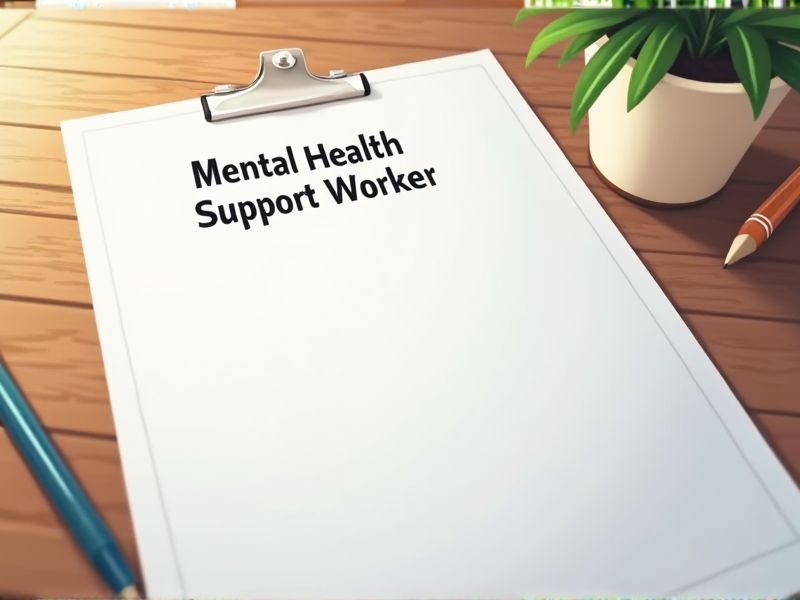
Mental health support workers require certain certifications to ensure they possess the necessary skills for effective client care. These certifications validate their understanding of mental health conditions and appropriate intervention strategies. Regulatory bodies often mandate certifications to maintain standardization and quality in mental health services. Here are some essential certifications you may need as a Mental Health Support Worker.
Mental Health First Aid Certification
Mental Health First Aid Certification equips support workers with essential skills to identify early signs of mental health issues, improving intervention outcomes. It fosters a deeper understanding of mental health conditions, which enhances empathetic communication with individuals experiencing mental distress. Certification also provides frameworks for de-escalating crises, reducing the potential for harm to both clients and workers. Employers recognize this credential, making certified workers more competent and valuable in addressing mental health needs effectively.
Certified Peer Support Specialist (CPSS)
Certified Peer Support Specialists bring lived experience, which fosters a deeper understanding and connection with those seeking mental health support. Their unique perspective can lead to more effective communication and trust-building, enhancing the therapeutic relationship. By sharing personal recovery experiences, CPSS can inspire hope and motivate others towards positive mental health outcomes. Their presence reduces stigma, often bridging gaps between mental health workers and clients, ensuring more comprehensive care.
Crisis Prevention Intervention (CPI) Certification
Crisis Prevention Intervention (CPI) Certification equips mental health support workers with de-escalation techniques that minimize the risk of injury during confrontational situations. This certification enhances a worker's ability to understand and manage behavioral patterns, leading to improved patient outcomes. By being CPI certified, workers demonstrate competence in maintaining a safe environment for both themselves and the individuals they support. Certification also ensures compliance with industry standards, reducing potential liability for employers.
Nonviolent Crisis Intervention Certification
Nonviolent Crisis Intervention Certification equips mental health support workers with skills to safely manage aggressive or crisis situations, reducing the risk of harm to both staff and clients. This certification also enhances communication strategies, fostering a more therapeutic environment for individuals experiencing mental health crises. Trained workers are better prepared to identify early warning signs of escalation, which aids in timely intervention and potentially prevents situations from worsening. Incorporating these interventions contributes to better overall patient outcomes and aligns with best practices in mental health care.
Trauma-Informed Care Certification
Trauma-Informed Care Certification equips mental health support workers with specialized knowledge to recognize and address the complex needs of trauma survivors, creating safer therapeutic environments. This certification increases the worker's ability to foster trust and rapport, essential for effective treatment outcomes. Understanding trauma's impact on behavior helps tailor interventions that mitigate retraumatization, enhancing treatment efficacy. Enhanced skills from certification contribute to reduced burnout among support workers, maintaining a resilient and effective workforce.
Suicide Prevention Training Certification
Suicide prevention training certification equips mental health support workers with essential skills to identify and respond to suicide risk factors, reducing the likelihood of harm. Trained workers can recognize subtle signs of distress, enhancing early intervention and support for individuals in crisis. Certification provides workers with standardized techniques, ensuring a consistent approach in handling sensitive situations. With proper training, mental health support workers gain confidence and competence, strengthening the overall mental health support system.
Basic Life Support (BLS) Certification
Basic Life Support (BLS) Certification equips mental health support workers with essential skills to handle emergencies such as cardiac arrest, which can occur unexpectedly in any setting. Mental health patients may have co-existing physical health issues, increasing the likelihood of such incidents where BLS skills become critical. Possessing BLS certification enhances the overall safety environment, providing both workers and clients reassurance of competent emergency response. Some mental health facilities require BLS certification to ensure compliance with healthcare safety regulations and standards.
CPR Certification
CPR certification equips mental health support workers with the necessary skills to handle emergencies involving cardiac or respiratory arrest. In environments with increased stress, there's a higher likelihood of medical emergencies, necessitating immediate response. Having CPR skills can reassure clients and staff, fostering a safer therapeutic setting. Certification instills confidence, ensuring more effective crisis intervention and reinforcing the trust between support workers and those they assist.
Certified Addiction Counselor (CAC) Certification
Certified Addiction Counselor (CAC) certification is essential for a Mental Health Support Worker because it provides specialized training in addiction treatment, complementing mental health services. The certification ensures adherence to standardized ethical practices, which enhances client trust and safety. Having the certification distinguishes professionals in the job market, increasing employment opportunities and potential salary. It facilitates interdisciplinary collaboration by aligning mental health support workers with common guidelines in addiction and mental health fields.
Community Health Worker Certification
Community Health Worker Certification provides standardization, ensuring mental health support workers possess necessary foundational skills and knowledge. Certification enhances credibility, fostering trust among clients and employers, which can improve client outcomes. The structured training often included in certification programs helps equip workers with updated practices and techniques for effective mental health care. This certification can increase job opportunities and professional development, leading to a more competent and comprehensive healthcare workforce.
Summary
By obtaining certifications, you can enhance your skills and credibility as a Mental Health Support Worker. This often leads to increased job opportunities and potential career advancement. Employers may view you as more qualified, increasing trust and responsibility in your role. Client outcomes may improve as a result because certified workers are typically better equipped with evidence-based techniques.
